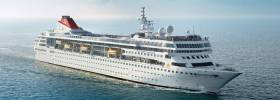Displaying items by tag: First cruisecaller in 20 years
#CruiseRosslare - Afloat’s tracking of known Irish Sea timber-trading cargoships recently led to Rosslare, synonymous for its ferries, is to welcome more business with a first cruise call in more than two decades, writes Jehan Ashmore.
In early July the honour of this inaugural cruise call will go to Fred Olsen Cruise Lines Braemar with more than 900 visiting passengers. The 24,344 tonnes vessel is to dock within the harbour and remain in port for up to 12 hours.
Last year Pheonix Reisen's similar capacity cruiseship Albatros which has a deeper draft was scheduled to anchor offshore. The call however was cancelled due to bad weather conditions preventing anchoring and tendering visitors ashore. To read more click here.
The call by Braemar this summer will be more keenly awaited by Rosslare Europort, where the harbour authority is unique for an Irish port in that it is operated by Irish Rail (Iarnród Éireann).
In addition the cruise call is to boost the season for businesses notably running visitor attractions in the ‘model’ county and that of Wexford town.
As reported previously on Afloat, Braemar took part in Fred Olsen's first ever fleet gathering to one port and all at the same time. The event took place in Bergen last year where the origins of Fred Olsen date back to 1848.
Since 1987 the operator have concentrated cruises departing from UK ports, through Southampton, Liverpool, Newcastle, Dover, Tilbury, Harwich and Falmouth.





























































